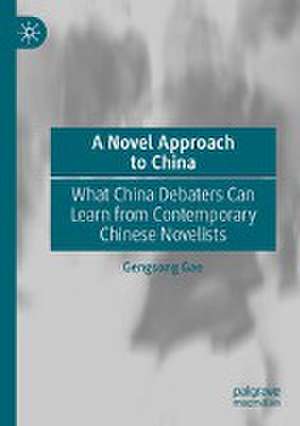A Novel Approach to China: What China Debaters Can Learn from Contemporary Chinese Novelists
Autor Gengsong Gaoen Limba Engleză Paperback – 5 ian 2023
| Toate formatele și edițiile | Preț | Express |
|---|---|---|
| Paperback (1) | 637.93 lei 6-8 săpt. | |
| Springer Nature Singapore – 5 ian 2023 | 637.93 lei 6-8 săpt. | |
| Hardback (1) | 642.39 lei 6-8 săpt. | |
| Springer Nature Singapore – 4 ian 2022 | 642.39 lei 6-8 săpt. |
Preț: 637.93 lei
Preț vechi: 750.50 lei
-15% Nou
Puncte Express: 957
Preț estimativ în valută:
122.07€ • 133.01$ • 102.86£
122.07€ • 133.01$ • 102.86£
Carte tipărită la comandă
Livrare economică 24 aprilie-08 mai
Preluare comenzi: 021 569.72.76
Specificații
ISBN-13: 9789811665202
ISBN-10: 9811665206
Pagini: 233
Ilustrații: XXVII, 233 p. 1 illus.
Dimensiuni: 148 x 210 mm
Greutate: 0.35 kg
Ediția:1st ed. 2021
Editura: Springer Nature Singapore
Colecția Palgrave Macmillan
Locul publicării:Singapore, Singapore
ISBN-10: 9811665206
Pagini: 233
Ilustrații: XXVII, 233 p. 1 illus.
Dimensiuni: 148 x 210 mm
Greutate: 0.35 kg
Ediția:1st ed. 2021
Editura: Springer Nature Singapore
Colecția Palgrave Macmillan
Locul publicării:Singapore, Singapore
Cuprins
Chapter 1: Public Function and Literary Singularity: Post-Tiananmen Intellectual Debate and Literary Criticism.- Chapter 2: Han Shaogong: Revealing and Reworking Chinese Linguistic Background.- Chapter 3: Han Shaogong: Revealing and Reworking Chinese Linguistic Background.- Chapter 4: Chen Zhongshi: Disclosing a Local Everyday Confucian World.- Chapter 5: Towards a Dialogic Chinese Studies.
Notă biografică
Gengsong Gao is Assistant Professor of Chinese Studies at the University of Richmond, where he teaches Chinese language courses and courses concerning modern and contemporary Chinese literature and culture.
Textul de pe ultima copertă
Gengsong Gao is Assistant Professor of Chinese Studies at the University of Richmond, where he teaches Chinese language courses and courses concerning modern and contemporary Chinese literature and culture.
This book explores Chinese novelists’ distinctive contributions to the China debate in terms of the key issues of Chinese language, power dynamics and Confucian tradition. As China is rising, Chinese scholars and policymakers are debating heatedly over China’s past, present and future. Who are the major debaters? How do they analyze China’s problems and figure out solutions? What are the main achievements and weaknesses of the Chinese intellectual debate and discourse? Chinese novelists also get involved in the China debate. However, their voices are rarely heard. This book argues that, by dramatizing the diversities of ordinary social actors’ everyday languages, active discursive practices and enchanted local traditions, Chinese novelists do not merely illustrate the dominant liberal, the New Left and the New Confucian ideologies, but enrich the China debate and provide a “novel” approach to our understanding of modern China.
“Gengsong Gao’s A Novel Approach to China is a highly original, multidimensional contribution to literary studies and Chinese thought, the kind of work that deserves widespread attention. First, he outlines and criticizes theoretical trends in postsocialist Chinese literary studies to show how these theories have blocked out the capacity of Chinese literary texts to articulate political and social issues in ways that the language of political argument has not. Second, he lays out the major positions of the political debates in post-Tiananmen China—liberals, New Confucians, New Left, Maoists, etc. Then he introduces the problematic of the social imaginary, the common background shared by all of a society’s discourses, to connectthe analysis of literature to the language politics. Gao’s discussion of three contemporary novels by Han Shaogong, Wang Xiaobo, and Chen Zhongshi shows how these texts employ linguistic strategies that break down the ideological grids of the debate, not in order to deconstruct them, but to provide the resources for their enrichment. Readers of this book will not only get a thorough treatment of the relationship of Chinese literary theory to the West but an innovative theoretical problematic that opens a new way for literature to contribute to public debates.” —Meili Steele, Distinguished Professor Emeritus, University of South Carolina at Columbia.
Caracteristici
Provides a “novel” approach to our understanding of modern China Explores Chinese novelists’ distinctive contributions Dramatizes ordinary social actors’ everyday language
